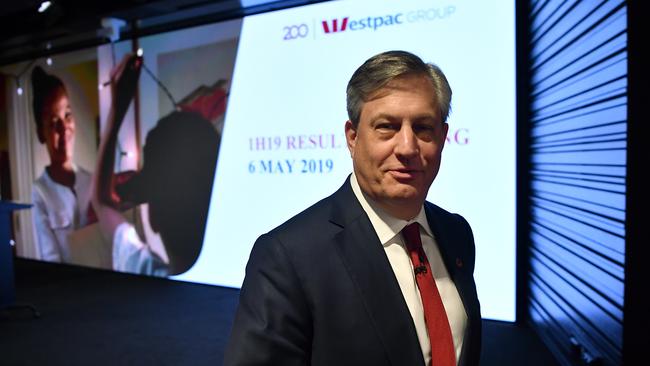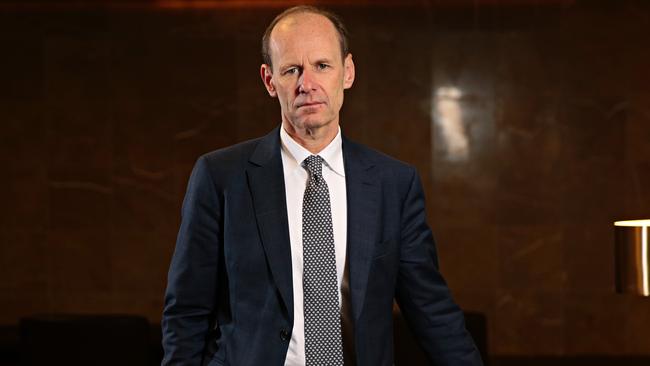Bonus loss trims Westpac, ANZ bosses’ pay
The CEOs of Westpac and ANZ have taken a haircut on take-home pay, amid a crackdown on short-term bonuses.

The chief executives of two of Australia’s biggest banks, Westpac and ANZ, have taken a haircut on take-home pay, amid a crackdown on short-term bonuses.
Westpac chief executive Brian Hartzer has taken a $1.5m haircut on his take-home pay after the bank’s board agreed to withhold any short-term bonuses to make the lender’s boss accountable for “poor” risk-taking and consumer outcomes.
Mr Hartzer took home a total pay packet of $5.05m last financial year, down from the previous year’s $6.57m, after he recommended to the board that he “forego” his short-term incentive.
Along with his short-term bonus being reduced to zero, Mr Hartzer and the rest of the bank’s 12-strong executive group all lost out on receiving a long-term bonus, which usually accounts for about 30 per cent of a banker’s take-home pay.
Meanwhile, ANZ Bank chief executive Shayne Elliott pocketed $4.1 million in pay last year after receiving less than half of his maximum short-term bonus.
Ilana Atlas, chair of the bank’s human resources committee, said Mr Elliott had a “solid” year, where he demonstrated strong leadership in dealing with the challenges faced by ANZ and the industry.
“However, as CEO he is accountable for the overall performance of the group, and as a result was awarded annual variable remuneration of 48 per cent of the maximum opportunity,” Ms Atlas said.

Westpac on Monday unveiled a 15 per cent fall in annual profit to $6.85bn, after what Mr Hartzer labelled a “disappointing year”.
Shareholders last year delivered an overwhelming message of dissatisfaction with the bank’s remuneration practices, with almost two-thirds of shareholders voting against executive salaries at the annual general meeting — more than twice the 25 per cent threshold required for a
“first strike”. If a company receives a second strike in a consecutive year, shareholders have the option of going to a secondary vote to spill a company’s board.
“The CEO recommended to the board that he forego his STVR for this year,” noted Westpac’s annual report, released on Monday.
“The board separately considered the matter and determined that a zero STVR (short-term variable remuneration) outcome for 2019 for the CEO was appropriate to reflect accountability for poor non-financial risk and financial outcomes, as well as some poor customer outcomes, including those highlighted at the royal commission.”
Westpac employs the equivalent of more than 33,000 full-time employees, and has a total employee expenses (excluding redundancies and the like) of almost $4.8bn — making an average salary or across the business of about $140,000 per full-time employee. Across the group, the variable bonus pool was cut by $1.26m over the year.
Westpac also showed the door to 163 employees over the year after managing 1134 “conduct matters” during the period. More than 500 employees were subjected to “formal disciplinary outcomes”.
“It’s very important that we have strong alignment between the executives and the shareholders,” Mr Hartzer said.
“It was clear to me early in the year given the magnitude of the provisions that there was going to be a significant impact on the financials, and I thought that it was important that I recognise that impact,” he said.
Westpac chairman Lindsay Maxsted said Mr Hartzer had not had an increase in his fixed base pay, which is about $2.6m a year, since he took on the role in 2015.
“The board and I recognise that our decisions on executive remuneration in 2018 were not in line with shareholder expectations,” Mr Maxsted said.
“In response, we have consulted extensively over the year to better understand shareholder views and act on their feedback. We met with groups of individuals with the help of the Australian Shareholders’ Association and we held a number of meetings with institutional shareholders and advisory groups. I have also received significant correspondence from shareholders,” he said.
The Australian Prudential Regulation Authority is currently aiming to overhaul executive pay structures across the financial services industry amid concern bankers and fund managers are being rewarded too greatly for taking risks, but are not being punished when they breach the law or when things go wrong.
APRA’s slated approach includes prescribing that performance measures such as customer satisfaction levels, compliance and conduct, which are non-financial, account for 50 per cent of short- and long-term bonus payments. Financial metrics such as earnings or share price growth can account for the remainder.



